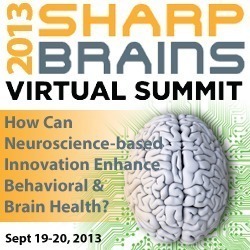5 ways to protect your brain, and boost your career
http://sharpbrains.com/blog/2013/08/30/update-5-ways-to-pro%C2%ADtect-your-brain-and-boost-your-career/
Sent via Flipboard



The Brain Injury Association of New York State (BIANYS) is offering a free webinar: From the Desk of the School Nurse: How to Implement A Concussion Management Protocol.
Time and date: Wednesday, August 28, 2013, 11:00 a.m. - 12:15 p.m. (EDT)
Overview: The presenter, Patricia McLaughlin, RN, will focus on the importance of taking a multi-disciplinary team approach to concussion management and how best to implement a concussion management protocol in a school district setting. Patricia McLaughlin is a parent and a registered nurse with 25 years of experience. She is a current member of the staff at Albany Medical Center Coronary Care Unit. Mrs. McLaughlin also works as a full-time school nurse at Pine Bush Elementary School K-5, where she has been for 6 years.
For more information, please click here
More evidence for the PFIT model of intelligence and brain networks. Very consistent with recent MindHub Pub white paper.
Brain's Flexible Hub Network Helps Humans Adapt
http://neurosciencenews.com/neuroscience-cognitive-brain-function-networks-361/
Sent via Flipboard
 In order to start gathering good thoughts and momentum for the upcoming 2013 SharpBrains Virtual Summit, we are going to run an interview series with Summit Speakers and Participants between now and mid-September, via this blog.
In order to start gathering good thoughts and momentum for the upcoming 2013 SharpBrains Virtual Summit, we are going to run an interview series with Summit Speakers and Participants between now and mid-September, via this blog.
Please make sure to visit us often to learn about how 100+ pioneers will respond to these questions:
We look forward to sharing and discussing stimulating answers!